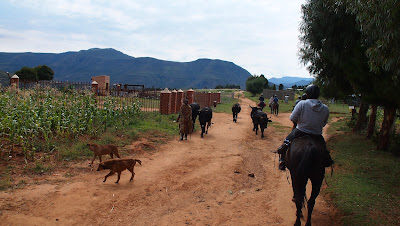I enjoyed the first weekend of the break - Colleen
(one of the ETAs) flew in from Port Elizabeth and Rob came down from Pretoria
on Friday. We went to the South Africa versus India cricket match on Friday
night, which was an eye-opening experience. It was mostly
"eye-opening" because I have very little concept of the game and we
spent the entirety of the game trying to figure it out. Also, unlike the
traditional games, this was a shortened version, which made it "more
exciting" (it still needs to be MUCH more exciting). Nonetheless, we
brought a picnic and enjoyed the atmosphere of the game before a thunderstorm
delayed the game about two-thirds of the way through. After the game we met up
with Ben (the other ETA in Pretoria) in my neighborhood, Melville, for a few
drinks. We went to a pretty chill bar, with dancing and an overall great
atmosphere. We met up with one of my roommate, Nelli, and her friend too … and
even ran into a South African soap opera star at the bar (he's on the show
"Rhythm City"). On Saturday, we went to the Melville Koppies, the
nature reserve near my house before dropping Rob off at the Gautrain for
Pretoria. Afterward, Colleen and I went to the Apartheid Museum and Soweto. The
Apartheid Museum is really well done and was powerful to see. I also feel like
I gained a deeper understanding of Apartheid and its impact on South Africa,
both during the regime and in present-day South Africa.
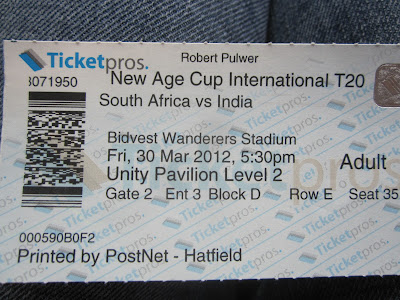

 |
| RSA vs. India |
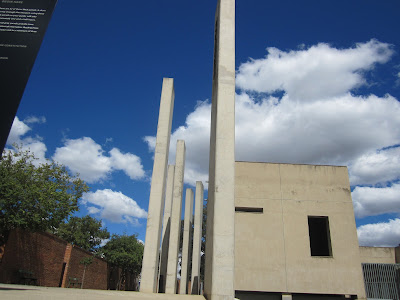 |
| Apartheid Museum |
Durban
On Sunday morning, I picked up Mariann, Ben, and
Rob and we set off for Durban. It was a beautiful five-hour drive, going from
the Gauteng province, through Mpumalanga, to the KwaZulu-Natal province (see
pictures/map). When we arrived, we checked into our hostel and went for a few
drinks before a wonderful Indian dinner. Durban has the second largest Indian
population outside of India in the world - we had to be sure to take advantage
of it. Our hostel was nice, clean, and welcoming. It was about a 20 minute walk
to the ocean and was a block away from a popular street with restaurants,
cafes, and bars.
On Monday, we decided to check out the city,
driving to one of the cities' many markets and walked around to get a
"feel" for the city. Durban is a beautiful city; I do not feel it
gets the appreciation it deserves from tourists - maybe because it is so
incredibly hot and humid in the summer? Most people visiting South Africa
prefer to go between Cape Town and Port Elizabeth or head north toward Kruger
National Park. In any event, after our trek through the city we went to the
beach and relaxed. I jumped around in the massive waves for a while, acting
like a "big little kid" and then got some sun.
On Tuesday, we went up the Moses Mabhida Stadium
arch, the stadium Durban built for the World Cup. Interesting, the stadium is
shaped like the "Y" of the South Africa flag. From the top of the
arch, we had a great view of the city. Afterward, we went down to the port and
took a boat ride. It was nice to get out on the water (how could we go to the
Indian Ocean not go on a boat?). We then went back to the beach and I worked on
my sunburn. For dinner, we met up with a Fulbright Scholar who is doing
HIV-related research (he's a current medical student at NYU). It was nice to touch base with another Fulbrighter
and hear about his experiences.
 |
| Mpumalanga |
 |
| Curry Market |
 |
| Durban City Hall |
 |
| Nelson Madhiba Stadium |
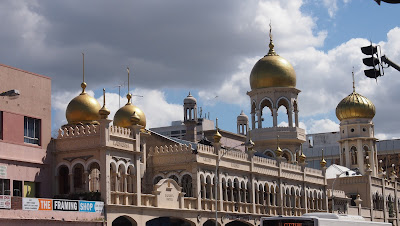 |
| Juma Musjid Mosque - the largest in the Southern Hemisphere |
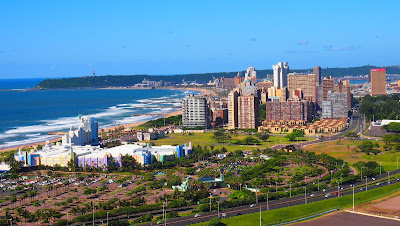 |
| Durban |
 |
| Mariann, Ben, Colleen, Rob, and Me |
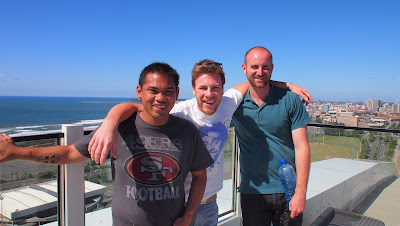 |
| Ben, Me, Rob |
Warner Beach
We left Durban on Wednesday morning, heading about
30 km south of Durban to the "beach town" of Warner. It was nice to
see a different part of the coast and get to a more relaxed area (rather than a
city). Our hostel was a backpackers hostel, with a very "surf-y" vibe
to it, and it overlooked the ocean. We spent the day riding bikes, walking
around the town, and I even tried surfing. With surfing I learned: 1) I need
wax on my board - I kept slipping off, which made it extremely difficult and 2)
I need lessons before I try again. To make matters worse, the waves were massive,
the tide was really strong (it swept me about 300m from where I started), and
I'm not too fond of sharks (Durban/KwaZulu-Natal is known for sharks). In any
event, we made dinner at the hostel and crashed early, worn out from the sun
and our sunburns.
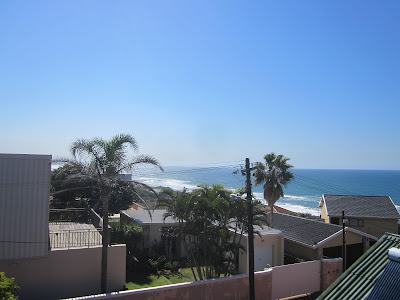 |
| View from hostel |
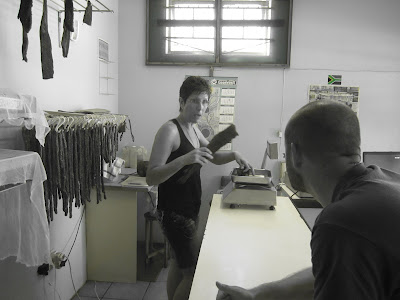 |
| Rob buying biltong ("bil-tongue") - SA style jerky |
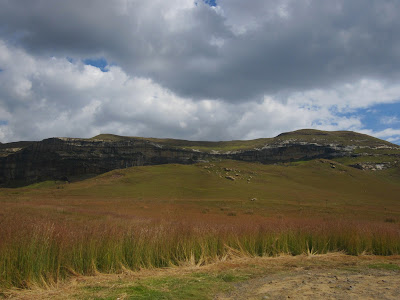 |
| Drive through Golden Gate Park (Free State) |
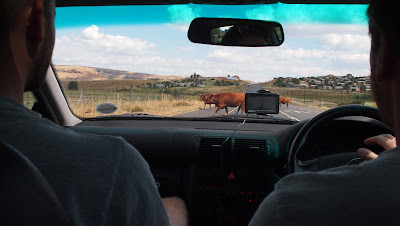 |
| Cattle-crossing |
Ladybrand
We set off for Ladybrand on Thursday morning,
traveling from the coast, inland (see link to Google map), through the
mountains of the Free State. It was a long drive, but extremely beautiful. The
Free State is so untouched and "raw" - I find it difficult to
describe. We drove through Golden Gate Park and through the small towns
scattered throughout the southern part of the Free State. After a beautiful,
yet long seven-hour drive, we arrived in Ladybrand. Ladybrand is a sleepy
little town about 15 kms outside of Maseru, Lesotho (in South Africa). We
stayed in a lovely B+B run by a couple formerly from Pretoria. The rooms were
really nice, the breakfast filling, and the couple was very helpful. After we
arrived on Thursday, we drove to Maseru, hoping to check out the city and get
dinner. We drove to the border to find a multi-kilometer long queue full of
Lesothoans (is that right?) and South Africans alike, trying to get into
Lesotho for the holiday. After two hours of traffic, we got our passports stamped
on both sides and headed into the city. There isn’t much to Maseru, but it was
neat to drive through and get a "feel" for the city. It is pretty run
down and full of informal markets. We found a restaurant (one of two) and had
dinner before heading back to Ladybrand; fortunately, the customs going back to
South Africa didn't take too terribly long.
On Friday, we had a pony trek scheduled, about
80kms away in Lesotho. With a 2.5 hour drive (due to poor roads) and what was
assumed to be a long border crossing, we left early to make it to the pony
trekking lodge at 10am. Determined not to wait in a long line, I decided that
if there was a queue I would drive past it, claiming either: 1) that I already
had a Lesotho stamp (trying to use the stamp from the day before) and/or 2) pleading
an ignorant American. Surprisingly, there was a short queue and I was able to
go around it when everyone else stopped at the border to get their passports
stamped. Rather than stop, I drove up to gate, handed the South African officer
my passport and gave him a "thumbs up" - the South African universal
sign for everything: "I acknowledge you," "I'm fine" (if
someone is selling you something), "thanks", et cetera. He handed me
back my passport and let me through, not checking anyone else's passport in the
car. Whew. On to the Lesotho side, I tried the same, giving the police officer
my passport. She replied "where's your stamp?" (I handed her the page
opened with the Lesotho stamp from the day prior). "Oh, sorry, I just
opened up the page - it should be a few pages behind it." She looks, hands
it back to me, and I give her a thumbs up… we made it into Lesotho without a
stamp! We continued on to the Malealea Lodge, some 60 kms away. As we drove,
the roads became progressively worse, until they were unpaved, with rocks,
pot-holes, and I could barely get out of first gear. We finally made it, after
winding our way through the mountains of Lesotho, with narrow roads, and less
than ideal driving conditions.
Just for some background - Lesotho (le-sue-too) is
it's own country inside of South Africa. It is known as the "mountain
kingdom", being the country with highest elevation in Southern Africa.
It's constitutional monarchy, the main language is Sesotho (say-sue-too), and
it is a largely agricultural/herding culture. Due to the rugged terrain, the
major means of transport is horse/donkey.
When we arrived at the lodge, we checked in and got
our horses. After a less-than-detailed overview of how to ride, we set off on
our seven-hour trek. The nine of us in our party had three local guides, each
on horse. My writing, nor pictures, will do justice to the beauty of the
country. There are few places in this world that I would say are more beautiful
than Lesotho - it is just untouched, raw natural beauty. Now, I assumed that
the trek would be a nice, easy, ride through flat trails. Not so. After about
20 minutes, we started our first descent into the valley, with our horses
navigating through a narrow rock trail down (about 1000m down) through
cut-backs. We rode through the valley, across the river, and headed up the
mountain (in a similar fashion to our way down). To demonstrate how
underdeveloped and steep the trails were: many of the horses in our group
simply refused to go up/down the trails (or were stubborn and waited until they
were "encouraged" to go). Being the incredible equestrian I am, my
horse was able to successful manage the trails - we had a good relationship, it
must've been my sweet talking. We stopped on top of one of the mountains,
dismounted, and a local guided us down a steep trail to a waterfall. We went
back up for lunch (that we packed), shared them with our guides, and rested
(riding a horse isn't the most comfortable thing one can do!). We continued up
and down the mountain for a few hours and arrived at the top of a gorge. A
local met us as we dismounted and she led us down into the gorge to bushman
paintings, some 27,000 years old. I think the most profound part of the trek
was that all of this was just so "raw" - in other parts of the world
or even South Africa, there would be development or tourism. Not so in Lesotho.
After investigating the paintings we went back up to our horses and headed back
to the lodge…It was an incredible experience and, well, I was happy to get off
the horse at the end of the day :) On the way back, we tried to go through the
border crossing again without getting stamped. Same thing as when we entered - I hand my passport to the
officer, give a thumbs up and proceed. We got in and out of Lesotho without
stopping!
On Saturday morning, we had breakfast and heading
back to Johannesburg - driving through the Free State. It was a beautiful
drive, but the numerous potholes made the drive a bit tedious. Overall, it was
a wonderful trip … the best of both worlds, mountains and ocean. I really
enjoyed seeing so much of the country, relaxing, and taking in some memorable
experiences.
Itinerary
Sunday, 1 April: Johannesburg - Durban
Monday, 2 April: Durban
Tuesday, 3 April: Durban
Wednesday, 4 April: Durban - Warner Beach
Thursday, 5 April: Warner Beach - Ladybrand -
Maseru - Ladybrand
Friday, 6 April: Ladybrand - Maseru - Ladybrand
Saturday, 7 April: Ladybrand - Johannesburg
 |
| Trusty Horse! |
 |
| Maseru |
 |
| Bed and Breakfast in Ladybrand |


















































































